|
|
|
Sort Order |
|
|
|
Items / Page
|
|
|
|
|
|
|
| Srl | Item |
| 1 |
ID:
148233
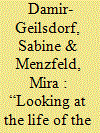

|
|
|
|
|
| Summary/Abstract |
This article explores self-ascriptions, processes of inclusion and exclusion, and senses of belonging in the everyday lives of German Muslims who orientate themselves towards the Salafiyya. Based on ethnographic fieldwork and in-depth interviews taking place over a year and a half, we draw on two case studies to show how demarcation lines between ‘us’ and ‘others’ can be established within the diverse Salafi communities and Salafi self-positioning in non-Muslim surroundings. The article sheds light on what orientation towards the life of the Prophet and the salaf sālih (the pious ancestors) means for the informants, especially focusing on their negotiations of being Salafiyya-oriented Muslims and citizens of Germany. Looking at their reasoning behind their own standing towards other persons labelling them Salafis, towards non-Salafis and towards possible opponents of Salafism, we provide insight into negotiations of political action, citizenship, identity and belongingness from an emic approach.
|
|
|
|
|
|
|
|
|
|
|
|
|
|
|
|
| 2 |
ID:
152021
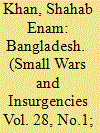

|
|
|
|
|
| Summary/Abstract |
Bangladesh is currently facing an incremental growth of radicalization. This radicalization can be traced back to the country’s early post-Independence years. Over time, political violence, ideological clashes between secular and right-wing ideologies, and weak governance have created conditions for the growth of radical Islam. The public rhetoric on corruption, weakening of democratic institutions, inadequate law enforcement agencies, fragile justice delivery system, fledgling educational and social institutions and growing unemployment provides further space for alternative narratives by extremist ideologues. Home-grown extremist outfits have received ideological and tactical supports from transnational terrorist network such as Islamic State (IS) and Al-Qaeda in Indian Subcontinent (AQIS), but only in a limited manner. The supply and demand side of radicalization in Bangladesh has not yet been addressed by actors such as the government, private sector, civil society and media. The failures in multiple sectors in the state governance have led to a situation where IS and AQIS now see Bangladesh as a potential ground for exerting their supremacy as flag bearers of radical forms of Islam.
|
|
|
|
|
|
|
|
|
|
|
|
|
|
|
|
| 3 |
ID:
153107
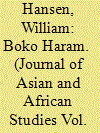

|
|
|
|
|
| Summary/Abstract |
This article is interested in shedding light on why a phenomenon such as Boko Haram came into existence and why it poses a threat to the very existence of the Nigerian state. The Boko Haram phenomenon, I argue, can only be understood as a reaction to more than a half century of corruption, venality, poverty, and abuse by the state predator class. My argument is that Boko Haram is the entirely logical consequence of more than five decades of the post-colonial Nigerian state ruled by a parasitic predator class that is itself a by-product of the colonial state.
|
|
|
|
|
|
|
|
|
|
|
|
|
|
|
|
| 4 |
ID:
111112
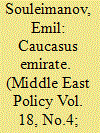

|
|
|
| 5 |
ID:
097705
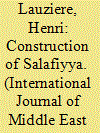

|
|
|
|
|
| Publication |
2010.
|
| Summary/Abstract |
For nearly a century of scholarship, uncertainties and paradoxes have beleaguered interpretations of the origins and meaning of Salafism (al-salafiyya). Although academics and journalists alike are well aware of the various definitions and conflicting narratives of Salafism, relieving some of the confusion that beclouds the term continues to prove difficult. Given that concepts are fluid and relational, this state of affairs may seem inevitable. Yet there are reasons to believe that the current confusion surrounding Salafism is in part attributable to faulty scholarship and that consequently the substance and history of this religious orientation will remain unnecessarily puzzling so long as the production of knowledge about Salafism goes unexamined. In that sense, recent scholarly efforts to remedy the situation by providing deeper insights into the intellectual, geographical, and political diversity of Salafism have produced mixed results, for they have largely overlooked two of the most persistent epistemological problems that are at the root of much of the present-day ambiguity.
|
|
|
|
|
|
|
|
|
|
|
|
|
|
|
|
| 6 |
ID:
164150
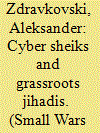

|
|
|
|
|
| Summary/Abstract |
What was the scope of the Bosnian jihadi participation in the war in Syria? Did the Bosnian volunteers tend to join one particular faction? Why did the Bosnian youngsters decide to join the holy war in the Levant? Was this an organized and hierarchical process or was this a grassroots movement? Last, were all the Salafis in Bosnia supportive of this dynamic or did this process cause internal frictions? These are some of the questions that this research will try to answer.
|
|
|
|
|
|
|
|
|
|
|
|
|
|
|
|
| 7 |
ID:
181094
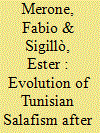

|
|
|
|
|
| Summary/Abstract |
What shape does Salafism take in Tunisia after the ban of the Salafi-Jihadi group Ansar al-Shari‘a and the wave of securitization carried out by national authorities? This article argues that a constraining legal context put Salafism's doctrinal rigidity in tension with its survival and ultimately prompted a residual current of Salafi actors to accommodate their stance toward Malikism, the prevalent school (madhhab) in the country. This adaptation is at odds with contemporary Salafism, which traditionally dismisses all four law schools (lā madhabiyya), rejects their blind imitation (taqlῑd), and claims the superiority of the Qur'an, hadith, and consensus of the salaf (pious predecessors) over jurisprudence (fiqh). To account for this puzzle, this article scrutinizes the historical development of Salafism and the evolution of its stance toward Malikism across three generational waves. It notably shows how religious securitization associated with the promotion of a “moderate” Islam pushed Salafi actors to redefine their ideology to preserve their preaching and teaching activities. We call Salafi-Malikism the outcome of this adaptive strategy. Drawing on the Tunisian case, we argue that, despite its purist claims, Salafism is not an immutable religious current, but can take different trajectories to survive in constraining environments.
|
|
|
|
|
|
|
|
|
|
|
|
|
|
|
|
| 8 |
ID:
101348
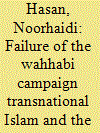

|
|
|
|
|
| Publication |
2010.
|
| Summary/Abstract |
The Salafi madrasa has evolved in Indonesia as a consequence of Saudi Arabia's immensely ambitious global campaign for the Wahhabization of the Muslim umma. Demonstrating the importance of transnational networks in shaping the current dynamics of Indonesian Islam, the madrasa appears to be the centre of excellence for the Salafi protagonists to spread Saudi-style Wahhabi Islam among Indonesian Muslims at the grass-roots level. Its curriculum places an emphasis on the teaching of tawhid, or more precisely, Wahhabite doctrine. Meaning to accept and believe in the oneness of God and His absolute authority, tawhid is considered by the Salafis to be the pillar of the Muslim creed, whereby a superior moral order is established at the level of the individual, the family or the community. Because of its exclusive style and old-fashioned structure, it has attracted only a few abangan children, and thus has not brought about significant change. There is scepticism about the relentless effort of the Salafi teachers to recruit young villagers into their circles and introduce what they claim to be authentic Islam while criticizing local religious practices. Nonetheless, the impact of the madrasa has gone beyond the sphere of education. It has provided alternative access to education for underprivileged rural children and the downtrodden young and has offered a universal alternative model of truth and social action. Attempts to adjust the madrasa profile to the local context and national demands have been made by some Salafi protagonists in response to the geostrategic shifts and as a result of growing suspicion since 9/11 of the existence of the madrasa as a major training ground for terrorists.
|
|
|
|
|
|
|
|
|
|
|
|
|
|
|
|
| 9 |
ID:
132033
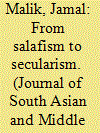

|
|
|
| 10 |
ID:
191898
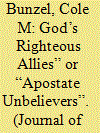

|
|
|
|
|
| Summary/Abstract |
In mid-2000, the publication of the anti-Taliban book Kashf Shubuhāt al-Muqātilīn caused a stir in jihādī circles. Written by Arab jihādīs based in Peshawar, Pakistan, the book made the case that it was not permissible for Muslims to fight alongside the Afghan Taliban on the grounds that the group was not sufficiently Islamic, having committed a host of polytheist acts. While some of the jihādī movement’s leading scholarly authorities quickly refuted the book, its anti-Taliban arguments nonetheless gained popularity over time. Today, the jihādī movement is divided between those who see the Taliban as a legitimate Islamic movement worthy of praise and support (the view espoused by al-Qaida and its supporters) and those who perceive it as an apostate movement standing in the way of true Islamic revival (the view adopted by the Islamic State and its supporters). The controversy over Kashf Shubuhāt al-Muqātilīn in 2000 prefigures the current divide and provides something of the context in which it should be understood.
|
|
|
|
|
|
|
|
|
|
|
|
|
|
|
|
| 11 |
ID:
107647
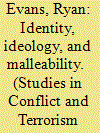

|
|
|
|
|
| Publication |
2011.
|
| Summary/Abstract |
Roel Meijer's edited volume fills massive gaps in the Western literature on Salafism, presenting a highly nuanced account of a diverse and internally divided religious identity movement while avoiding the opposing pitfalls of apologetics and polemics. Aside from the diversity of the movement, a key theme throughout the volume is the persistent malleability of Salafi ideology, which has major implications for states, social policy, and international security. The unavoidable conclusion seems to be that even "quietist" strands cannot be considered reliably quietist. Those who seek to better understand the tensions within Salafism, the relationship between this movement and states around the world, and how Salafism stands in relation to various forms of aggressive, violent contention would be well-advised to refer to this volume.
|
|
|
|
|
|
|
|
|
|
|
|
|
|
|
|
| 12 |
ID:
127597
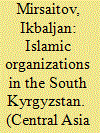

|
|
|
|
|
| Publication |
2013.
|
| Summary/Abstract |
The article examines the ways in which official and unofficial Islamic organizations operate in the south of Kyrgyzstan and analyzes their relations with the state. The author notes that unofficial Islamic organizations are mainly forming and developing in the republic's southern regions. The author singles out moderate apolitical and destructive religious-extremist organizations among them, Tablighi Jamaat and Hizb ut-Tahrir, respectively. He goes on to suggest ways for all the sides concerned (the state, Islamic organizations, and the media) to enter into a dialog aimed at opposing extremism.
|
|
|
|
|
|
|
|
|
|
|
|
|
|
|
|
| 13 |
ID:
143220
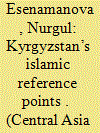

|
|
|
|
|
| Summary/Abstract |
This article examines Kyrgyzstan’s Islamic reference points that formed under the influence of the Islamic movements coming from Turkey, Saudi Arabia, Iran, and the states of the Indian Peninsula. It identifies the institutionalization aspects of these Islamic movements and how Kyrgyz society perceives them.
|
|
|
|
|
|
|
|
|
|
|
|
|
|
|
|
| 14 |
ID:
132366
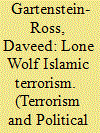

|
|
|
|
|
| Publication |
2014.
|
| Summary/Abstract |
This article is a detailed case study examining Abdulhakim Mujahid Muhammad (born Carlos Bledsoe), a lone wolf jihadist who carried out a fatal shooting at a joint Army-Navy recruiting center in Little Rock, Arkansas, on June 1, 2009. The article explores his early life, including involvement in violent and criminal activities that caused Muhammad to get into trouble with authorities, after which he decided to explore religion as an alternative that could keep him out of trouble. Muhammad found that he was attracted to the Islamic faith, and converted at the age of nineteen. The article explores Muhammad's subsequent turn toward Salafism, and chronicles his increasing extremism with reference to academic debates about the concept of radicalization and the role of religious ideas. Finally, the article explains Muhammad's attack on the recruiting center, and the manner in which he was able to continue his jihad even while imprisoned.
|
|
|
|
|
|
|
|
|
|
|
|
|
|
|
|
| 15 |
ID:
095228
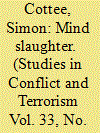

|
|
|
|
|
| Publication |
2010.
|
| Summary/Abstract |
This article focuses on the neutralizations of the jihadi Salafi ideology. It is divided into three parts. The first describes the various rhetorical accounts that ordinary people use to neutralize conventional moral controls against inhumane conduct. The second traces how these accounts inform and drive the jihadi Salafi worldview. The third, and concluding, part of the article sketches out the policy implications of the analysis set out here, arguing that any attempt to derail the global Salafi jihad must critically undermine the core neutralizations of the jihadi Salafi ideology, since it is these which enable jihadi combatants to escape conventional moral constraints and perpetrate acts of inhumanity.
|
|
|
|
|
|
|
|
|
|
|
|
|
|
|
|
| 16 |
ID:
119174
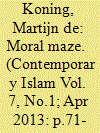

|
|
|
|
|
| Publication |
2013.
|
| Summary/Abstract |
The Salafi movement presents itself as a moral guardian of Muslims in a world that, according to many, is filled with moral crisis, temptations and anti-Islam tendencies. Salafis claim that it is essential to return to the community of the pious forefathers seen as the most outstanding community of all times with the highest absolute moral standard. In this article I will show how individual participants engage with this idea of a moral community of believers yet remain vulnerable to the ambiguities and ruptures inherent in everyday life and within the Salafi movement. By exploring how Salafis passionately try to search for the 'correct' knowledge and strive to maintain a unity between knowledge, conviction and behavior, and the role of friendships therein, I argue that Salafism does not remain separate from the troubles of everyday but that these issues enter into and exist in Salafi thought and practice, not by being resolved but by being transformed into personal struggles. These ambiguities and ruptures may cause problems but also provide an incentive for Salafis to continuously work at the self-improvement of one's piety, authenticity, and sisterhood and brotherhood.
|
|
|
|
|
|
|
|
|
|
|
|
|
|
|
|
| 17 |
ID:
094823
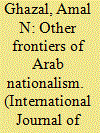

|
|
|
|
|
| Publication |
2010.
|
| Summary/Abstract |
The historiography of Arab nationalism has tended to concentrate on the secular press from the Mashriq, especially the Cairo-Beirut axis, at the expense of the religious nationalist press and the non-Mashriqi one. There is often an assumption that reliance on the secular press from the Mashriq alone can provide a clear picture of Arab intellectual life and that a proper analysis of that thought can be confined to a few intellectual centers in the eastern Arab world. Although there has never been an explicit claim that such a focus is the end of the story, there have not been enough attempts to look beyond the Cairo-Beirut axis and beyond its secular press organs in search of a broader story of the depth and breadth of Arab nationalism. This article addresses this imbalance by examining an Arabist-Salafi press network that operated between Algeria, Tunisia, Zanzibar, and Egypt and involved members of two sectarian communities, Sunnis and Ibadis. This Arabist-Salafi press network created a public sphere of intellectual engagement in which Salafism and nationalism were interwoven, producing a nationalist discourse transgressing post World War I borders of identity and linking the three layers of nationalism-the territorial, the Pan-Arab, and the Pan-Islamic-together. These layers not only intersected but also legitimized one another.
|
|
|
|
|
|
|
|
|
|
|
|
|
|
|
|
| 18 |
ID:
153141
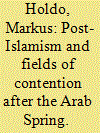

|
|
|
|
|
| Summary/Abstract |
In the aftermath of the Arab Spring, conflicts in Egypt and Tunisia over the authority to rule and the role of religion in society raised questions about these societies’ capacity for reconciling differences. In retrospect, the conflicts also raise questions about the theoretical tools used to analyse regional developments. In particular, the ‘post-Islamism’ thesis has significantly changed the debates on ‘Islam and democracy’ by bringing to light the changing opportunity structures, and changed goals, of Islamist movements. However, this paper argues that the theory underestimates differences within post-Islamist societies. Drawing on field theory, the paper shows how the actual content of post-Islamism is contingent on political struggle. It focuses on three fields whose political roles have been underestimated or misrepresented by post-Islamist theorists: Islamic feminism, Salafist-jihadism and the revolutionary youth. Their respective forms of capital – sources of legitimacy and social recognition – give important clues for understanding the stakes of the conflicts after the Arab Spring.
|
|
|
|
|
|
|
|
|
|
|
|
|
|
|
|
| 19 |
ID:
145062
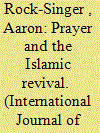

|
|
|
|
|
| Summary/Abstract |
This article traces the emergence of the early afternoon ẓuhr prayer as a key project of subject formation during the second half of the Anwar al-Sadat period (1976–81). Drawing on three Islamic magazines of differing ideological orientation (Muslim Brotherhood-Islamist, Salafi-Islamist, and state-sponsored), all containing letters to the editor and fatwa requests, it charts contestation among religious elites and the reception of their programmatic visions. Specifically, the article explores the performance of this daily prayer as a hybrid practice that disrupted the temporal and spatial claims of a state-sponsored bureaucratic order to produce national subjects within public schools and bureaucratic institutions, even as it reproduced the state's emphasis on temporal precision and social order. Based on these texts, this article challenges previous scholarly narratives that place Islamist projects of subject formation on the fringes of secularism and previous studies of Islamist mobilization that posit a separate social universe of Islamist activism.
|
|
|
|
|
|
|
|
|
|
|
|
|
|
|
|
| 20 |
ID:
115474
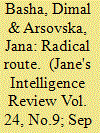

|
|
|
|
|
|
|
|